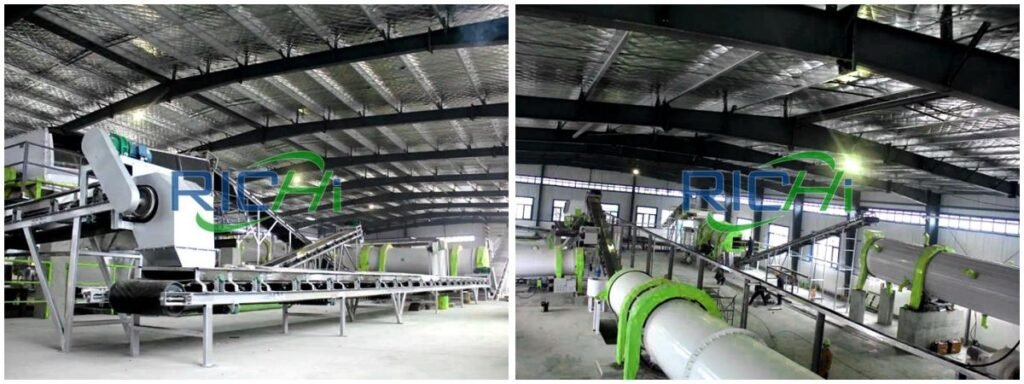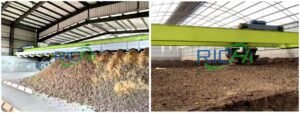In the realm of sustainable agriculture and waste management, organic manure making machines have emerged as pivotal tools for enhancing soil health, boosting crop yields, and reducing reliance on synthetic fertilizers. These specialized machines streamline the production of high-quality organic manures by transforming various organic waste streams into valuable soil amendments. Here, we explore the remarkable features that make these machines essential for farmers, gardeners, and environmentally conscious individuals.
1. Robust and Versatile Material Handling Capabilities
Organic manure making machines excel in processing a diverse range of organic materials including animal manures, crop residues, food waste, and municipal green waste. Equipped with robust material handling systems such as conveyors, hoppers, and shredders, these machines efficiently handle and pre-process various feedstocks. Advanced mixing and blending mechanisms further enable users to customize organic manure formulations, tailoring them to specific soil and crop requirements. This versatility ensures that the final product meets desired nutrient profiles and physical characteristics, optimizing its effectiveness as a soil amendment.
2. Efficient Composting and Stabilization Processes
Central to organic manure making machines is their capability to facilitate efficient composting and stabilization. These machines integrate advanced aeration and temperature control systems, maintaining optimal conditions for microbial activity and organic matter decomposition. Some models feature integrated turning and mixing mechanisms that aerate composting materials, promoting uniform decomposition and accelerating the process. This not only speeds up composting but also reduces odors and minimizes pathogen levels, enhancing workplace safety and comfort.
3. Advanced Drying and Pelletizing Technologies
To enhance handling, storage, and application efficiency, many organic manure making machines incorporate advanced drying and pelletizing technologies. These features enable the production of dense, uniform pellets or granules from organic manures. Pelletized or granulated forms are easier to handle, transport, and apply using conventional fertilizer spreaders or broadcasters. Moreover, the pelletizing process improves nutrient availability and extends the release profile, ensuring consistent nutrient supply to plants throughout the growing season.
Related post: https://www.richipelletmachine.com/chicken-manure-pellet-machine/
4. Energy-Efficient and Sustainable Design
Aligned with sustainable agriculture principles, organic manure making machines are designed for energy efficiency and sustainability. Leading manufacturers integrate energy-saving technologies like variable frequency drives, regenerative braking systems, and waste heat recovery units to minimize energy consumption and operational costs. Some machines are compatible with renewable energy sources such as solar panels or biogas generators, further reducing environmental impact and promoting eco-friendly practices. These features not only cut greenhouse gas emissions and pollution but also position organic manure producers as leaders in sustainable agriculture.
5. User-Friendly Controls and Automation Features
Modern organic manure making machines prioritize user-friendliness with intuitive controls and advanced automation features. Operators benefit from intuitive control panels or touchscreen interfaces that monitor and adjust parameters like temperature, moisture levels, and processing times. Automation systems optimize production processes based on real-time data, ensuring consistent product quality, boosting efficiency, and enhancing operator safety. Simplified operation reduces downtime and increases overall productivity.
6. Modular and Scalable Designs
Catering to diverse user needs, from small-scale farmers to large commercial operations, organic manure making machines feature modular and scalable designs. These machines can be customized with different components and processing modules, accommodating specific production capacities and requirements. Scalability allows for seamless expansion or upgrades as business needs evolve, minimizing equipment replacement costs and adapting to market dynamics effectively.
7. Comprehensive Quality Control and Monitoring Systems
Ensuring product quality and safety is paramount in organic manure production. Machines integrate comprehensive quality control and monitoring systems including advanced sensors and probes for real-time monitoring of temperature, moisture, and other critical parameters during composting and processing. Integrated sampling and testing capabilities enable on-site analysis of nutrient content, pH levels, and potential contaminants, ensuring compliance with industry standards and certifications.
Conclusion
As global demand for sustainable practices and organic products grows, organic manure making machines play a crucial role in meeting these needs. Investing in these machines equipped with advanced features not only capitalizes on the expanding market but also supports sustainable agriculture, enhances soil health, and fosters environmental stewardship. By transforming organic waste into valuable soil amendments, these machines contribute to a circular economy, reduce environmental impact, and promote a more sustainable future for agriculture and beyond.
For details please contact: Richi Pelletizer
WhatsApp:86 138 3838 9622
Email:enquiry@richipelletmachine.com



